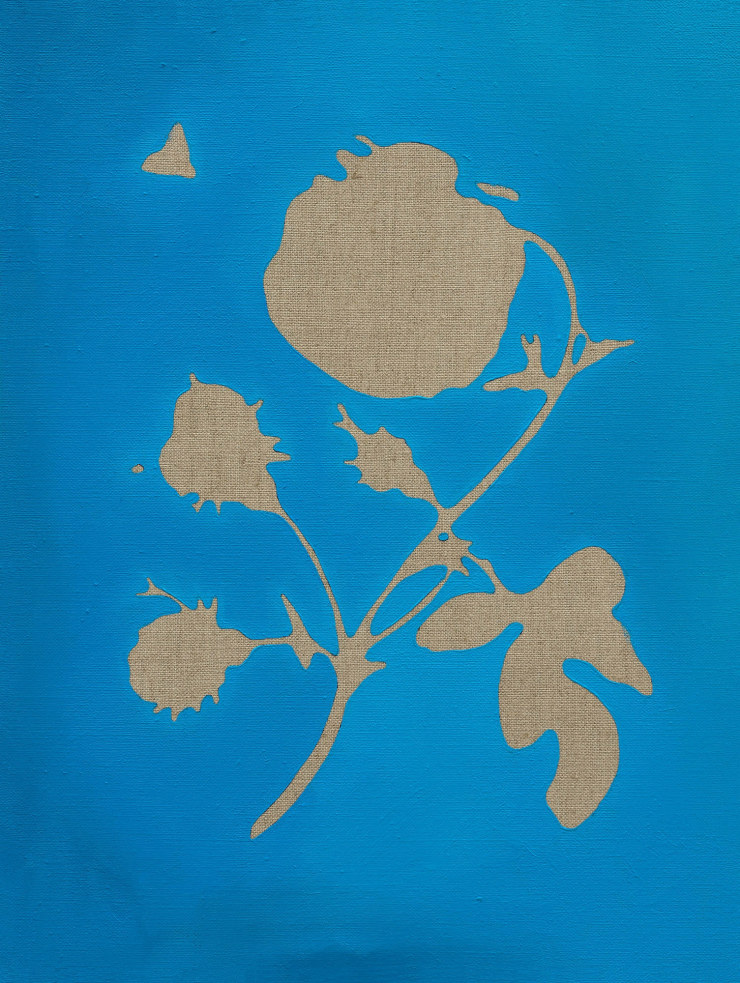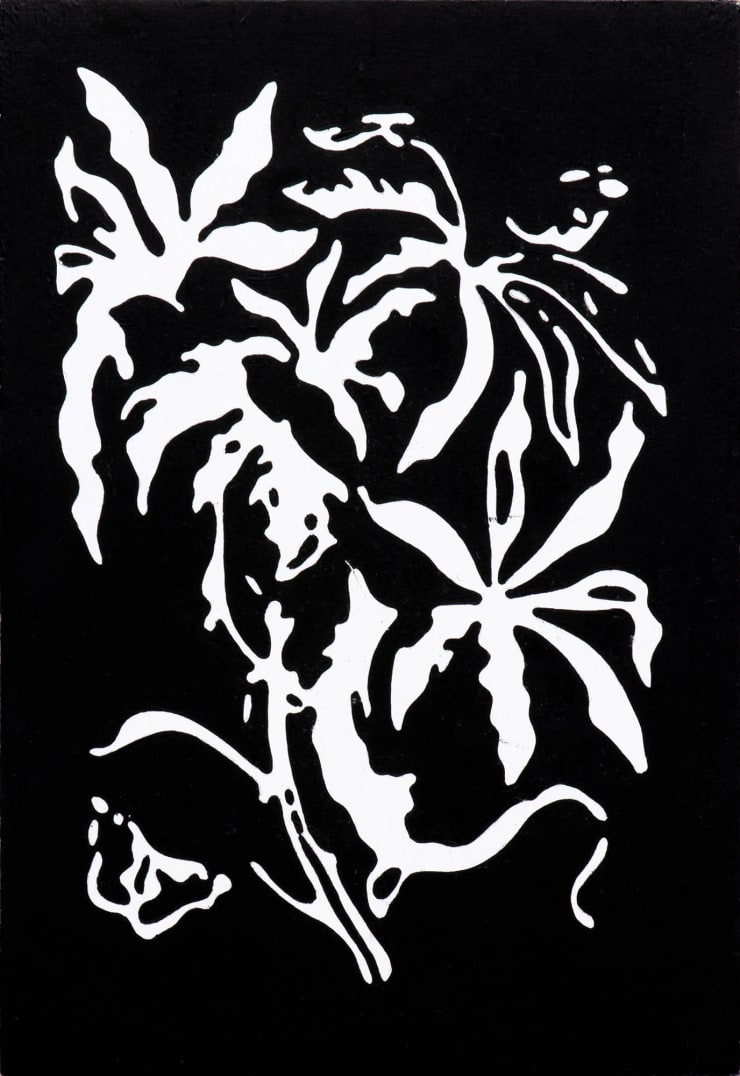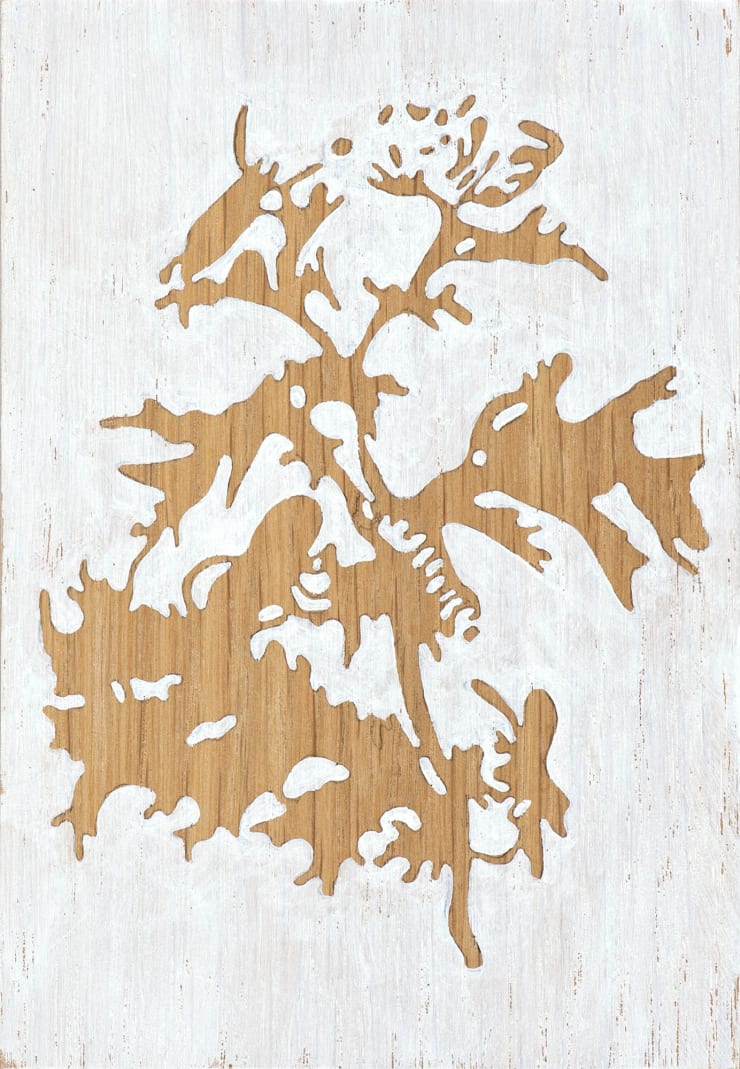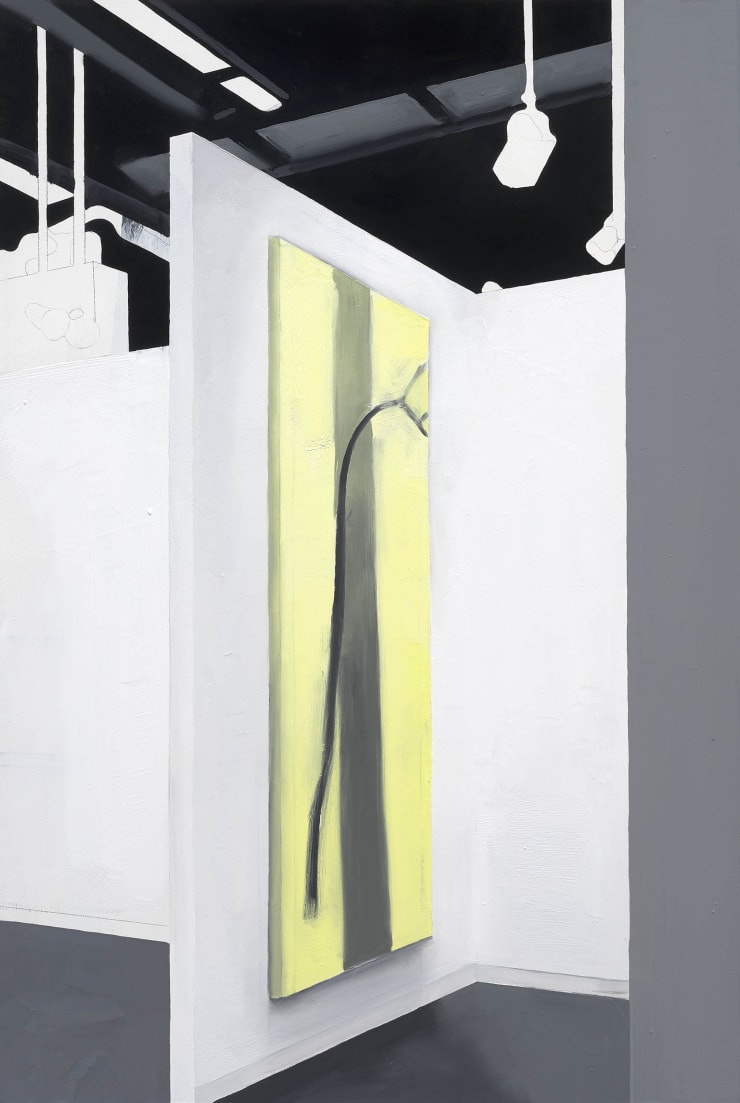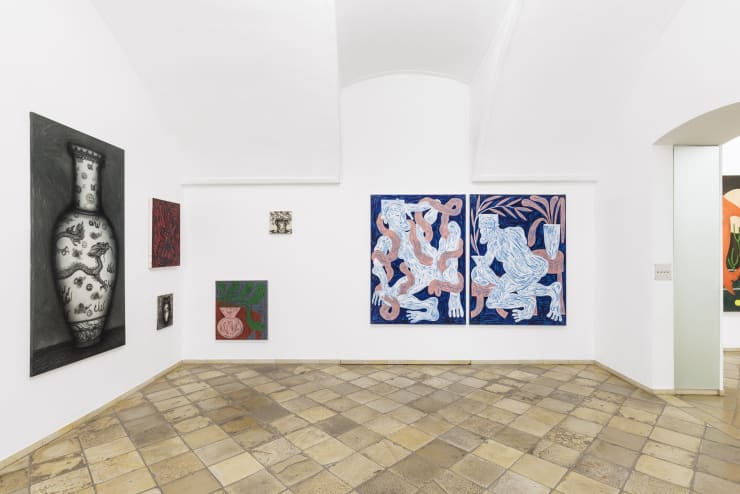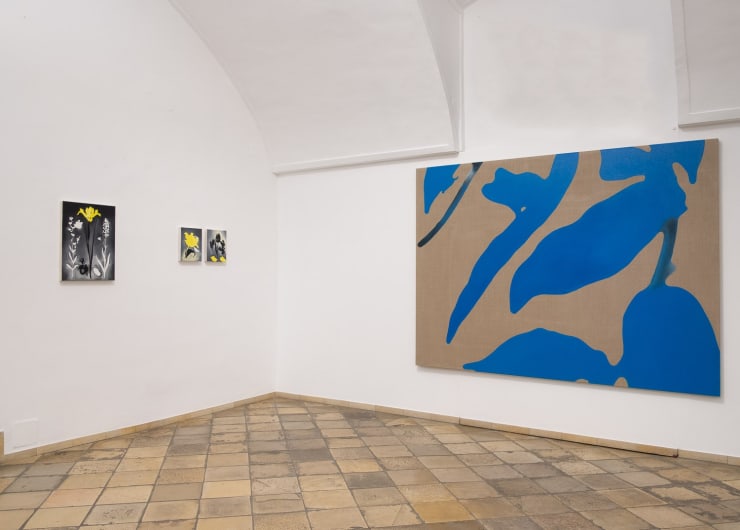Markus Huemer Austrian, b. 1968
Markus Huemer (* 1968 Linz) poses the question of the possibility of painting in the digital age. He moves to border areas where the reference to images replaces and overlays the actual images, blurring the boundaries between the original and the derivative. (Sprengel Museum, Hannover)
Huemer's insects and plant works refer to the copperplate engravings by the German naturalist Sibylla Maria Merian (1647–1717), who as a woman managed to discover a number of previously unknown animals and plants in Suriname, and to study and document their development. Huemer, for his part, creates paraphrases of these copperplate engravings by digitally processing the templates, painting them without mostly his own artistic signature and thus generating “new” biomorphic forms. In addition, they are displayed in non-realistic colors such as black, gray, white and yellow.
Knowing that all motifs today are created through processing with filters and only find their way onto the canvas through processing the photos, Markus Huemer, among others, asks questions about the problem of the difference between reality and visual reality in a medial completely changed present. Using a “jungle” of references, he develops a complex work that is dedicated to the analysis of digital media and the dissolution of the boundaries between painting/drawing and media art. Huemer selects individual points from the randomly computer-generated points and transforms them with a few lines (and expanded with two legs) into cheeky and self-confident birds that occupy the pictorial space, referring to the ancient Roman tradition of auspices (bird's-view). They were seen as essential yes/no decision machines and Huemer points to binary codes and digital decryption as a reading of the media.
Such an image is created by a digital process, but not an image of nature. Instead, the works are based on the underlying algorithms and programs and no longer refer to anything. The reference has replaced the actual image. Huemer's pictures ultimately turn out to be delusions. The often irritatingly long picture titles are essential for understanding Huemer's work, as they force the recipient to look at the pictures a second time in order to grasp their additional meaning.
-
 The Painting is dedicated to its visible similarities with other paintings, 2020View more details
The Painting is dedicated to its visible similarities with other paintings, 2020View more details -
 Gelbgrüner Macro Virus "Babas", 2019View more details
Gelbgrüner Macro Virus "Babas", 2019View more details -
 IchHaetteBApoAbgPrekaA, 2014View more details
IchHaetteBApoAbgPrekaA, 2014View more details -
 PotentiellGefaehrdURLA, 2018View more details
PotentiellGefaehrdURLA, 2018View more details -
 SelbstbestaeubCookieCA, 2014View more details
SelbstbestaeubCookieCA, 2014View more details -
 MonsterVirusA, 2018View more details
MonsterVirusA, 2018View more details -
 SST1 (Extinction Rebel 003), 2020View more details
SST1 (Extinction Rebel 003), 2020View more details -
 i752 (Extinction Rebel 005), 2020View more details
i752 (Extinction Rebel 005), 2020View more details -
 Permedia 3 (Extinction Rebel 011), 2020View more details
Permedia 3 (Extinction Rebel 011), 2020View more details -
 NV4 (Extinction Rebel 016), 2020View more details
NV4 (Extinction Rebel 016), 2020View more details -
 NV5 (Extinction Rebel 017), 2020View more details
NV5 (Extinction Rebel 017), 2020View more details -
 Banshee (Extinction Rebel 019), 2020View more details
Banshee (Extinction Rebel 019), 2020View more details -
 Avenger (Extinction Rebel 020), 2020View more details
Avenger (Extinction Rebel 020), 2020View more details -
 Condor 1 (Extinction Rebel 021), 2020View more details
Condor 1 (Extinction Rebel 021), 2020View more details -
 Toucan (Extinction Rebel 022), 2020View more details
Toucan (Extinction Rebel 022), 2020View more details -
 Savage 2000 (Extinction Rebel 023), 2020View more details
Savage 2000 (Extinction Rebel 023), 2020View more details -
 SGT 4000X (Extinction Rebel 025), 2020View more details
SGT 4000X (Extinction Rebel 025), 2020View more details -
 STG 4500 (Extinction Rebel 030), 2020View more details
STG 4500 (Extinction Rebel 030), 2020View more details -
 We Have to Roll Up Our Mind and Our Sleeves Too (03), 2006View more details
We Have to Roll Up Our Mind and Our Sleeves Too (03), 2006View more details -
 Augurs in Action (065), 2003View more details
Augurs in Action (065), 2003View more details -
 Augurs in Action (007), 2003View more details
Augurs in Action (007), 2003View more details -
 Augurs in Action (017), 2003View more details
Augurs in Action (017), 2003View more details -
 We See Our Task Primarily in Asking Well-Chosen Questions, 2007View more details
We See Our Task Primarily in Asking Well-Chosen Questions, 2007View more details -
 She Must be Strong, in Order, on the One Hand, to Virtually Compel Fully Elaborated Statements, 2007View more details
She Must be Strong, in Order, on the One Hand, to Virtually Compel Fully Elaborated Statements, 2007View more details -
 Augurs in Action (005), 2003View more details
Augurs in Action (005), 2003View more details -
 Augurs in Action (009), 2003View more details
Augurs in Action (009), 2003View more details -
 Augurs in Action (013), 2003View more details
Augurs in Action (013), 2003View more details -
 Augurs in Action (018), 2003View more details
Augurs in Action (018), 2003View more details -
 Sensitive Data, 2004View more details
Sensitive Data, 2004View more details -
 Desktop Enhancements, 2004View more details
Desktop Enhancements, 2004View more details -
 12 Files in a Portable Document Format, Integrated Flash Memory, 2004View more details
12 Files in a Portable Document Format, Integrated Flash Memory, 2004View more details -
 Anti-Spam Tool, Developer's Version, 2004View more details
Anti-Spam Tool, Developer's Version, 2004View more details -
 Thousands of Hotspots - Cheap and Wireless, 2004View more details
Thousands of Hotspots - Cheap and Wireless, 2004View more details -
 Spyware Remover, 2004View more details
Spyware Remover, 2004View more details -
 Verite 2200 (Extinction Rebel 007), 2020View more details
Verite 2200 (Extinction Rebel 007), 2020View more details -
 RV280 LX (Extinction Rebel 028), 2020View more details
RV280 LX (Extinction Rebel 028), 2020View more details -
 I Should Have Painted More Social-Political Spirituality Than Beauty for You All, 2017View more details
I Should Have Painted More Social-Political Spirituality Than Beauty for You All, 2017View more details -
 Detailed Virus "Bugbear", 2021View more details
Detailed Virus "Bugbear", 2021View more details -
 Monster-Virus "Inor", 2021View more details
Monster-Virus "Inor", 2021View more details -
 MGA 1164 SG (Extinction Rebel 001), 2020View more details
MGA 1164 SG (Extinction Rebel 001), 2020View more details -
 Scientific Notation: Virus "Dumaru", 2021View more details
Scientific Notation: Virus "Dumaru", 2021View more details -
 Rage 128 Pro (Extinction Pro 024), 2020View more details
Rage 128 Pro (Extinction Pro 024), 2020View more details -
 Red Virus "Brain", 2021View more details
Red Virus "Brain", 2021View more details -
 Fünf schöne Compoiler in einer salzliebenden Vegetation, 2005View more details
Fünf schöne Compoiler in einer salzliebenden Vegetation, 2005View more details -
 Virus "Swen" Approaching Insanity, 2021View more details
Virus "Swen" Approaching Insanity, 2021View more details -
 The Kiwis are Sour Because the Pumpkins Are Drawn Larger, 2021View more details
The Kiwis are Sour Because the Pumpkins Are Drawn Larger, 2021View more details -
 The Lemons Don't Like the Kiwi in the Drawing (01), 2021View more details
The Lemons Don't Like the Kiwi in the Drawing (01), 2021View more details -
 The Lemons Don't Like the Kiwi in the Drawing (06), 2021View more details
The Lemons Don't Like the Kiwi in the Drawing (06), 2021View more details -
 There is no Space for the Kiwi in the Drawing, 2021View more details
There is no Space for the Kiwi in the Drawing, 2021View more details -
 The Kiwis Blame the Lemon for its Colour, 2021View more details
The Kiwis Blame the Lemon for its Colour, 2021View more details -
 The Melon Blames the Lemon for its Size, 2021View more details
The Melon Blames the Lemon for its Size, 2021View more details -
 The Oranges Blame the Lemon for its Colour, 2021View more details
The Oranges Blame the Lemon for its Colour, 2021View more details -
 Rotbrauner Autorun Wurm Morphex (Version 1.1), 2019View more details
Rotbrauner Autorun Wurm Morphex (Version 1.1), 2019View more details -
 Unbekannte Scareware und Rootkit, 2019View more details
Unbekannte Scareware und Rootkit, 2019View more details -
 Dieses Gemälde ist sich selbst als unglaublichen Investment gewidmet, 2019View more details
Dieses Gemälde ist sich selbst als unglaublichen Investment gewidmet, 2019View more details -
 Kleiner Virus "Jerusalem", 2019View more details
Kleiner Virus "Jerusalem", 2019View more details -
 Autorun Wurm Morphex (Version 1.6), 2011View more details
Autorun Wurm Morphex (Version 1.6), 2011View more details -
 Gefährlicher Boot Sector Virus "AntiEXE", 2019View more details
Gefährlicher Boot Sector Virus "AntiEXE", 2019View more details
-

A SHOW WITH NO NAME
A WINTER SHOW 19 Nov - 21 Dec 2024Read more -

Tutti Frutti
Group Exhibition 4 Jul - 8 Sep 2023Read more -

ON PAPER
Group Exhibition 20 Jan - 11 Mar 2023The group exhibition 'ON PAPER' establishes a dialogue between selected contemporary artists and 20th century masters, presenting exclusively a single medium, works on paper.Read more
-

WHEN PAINTING KICKS IN
Group Exhibition 23 Jun - 30 Sep 2022The exhibition When Painting Kicks In shows selected works by eight contemporary artists who are primarily dedicated to painting, including Rade Petrasevic , who works within figurative pseudo-narratives and creates...Read more -

DEAD FLOWER
Group Exhibition 14 Mar - 15 Apr 2022Habsburgergass 5, 1010 ViennaRead more -

SINNESRAUSCH
Group Exhibition 19 Aug - 29 Sep 2021In the exhibition SINNESRAUSCH , Suppan shows new works by four contemporary artists from its program: Dénesh Ghyczy, Markus Huemer, Hermann Nitsch and Michael Ornauer. The gallery focuses on painting...Read more -

MARKUS HUEMER
Representative Freedom 23 Apr - 10 Jun 2021LOCATION Habsburgergasse 5, 1010 ViennaRead more


